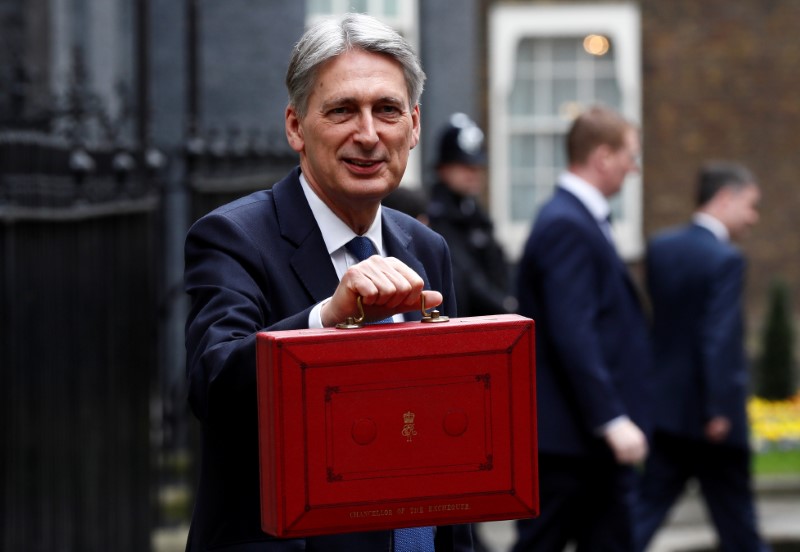By William Schomberg and David Milliken
LONDON (Reuters) - Chancellor of the Exchequer Philip Hammond avoided a potentially embarrassing slip-up before June's parliamentary election as he hit his budget deficit target for the 2016/17 financial year, but his fiscal challenge is likely to get harder.
The shortfall in the public accounts fell by nearly 28 percent to 52 billion pounds in the 12 months to the end of March, helped by the strength of the economy since the Brexit vote and one-off factors, official figures showed on Tuesday.
This was in line with a forecast set out in March by the country's budget watchdog, the Office for Budget Responsibility (OBR). At 2.6 percent of gross domestic product, the deficit was the smallest since the eve of the global financial crisis, and no longer high by international standards.
Furthermore, it was smaller than previous OBR forecasts including one made before British voters delivered their shock decision to leave the European Union last June.
Even so, the deficit is expected to rise in the 2017/18 financial year as one-off factors that helped the government last year - such as changes in the timing of payments to the EU budget and the impact of changes on dividend taxation - unwind.
Looking further ahead, whoever wins the national election on June 8 needs to work out how to pay for rising costs related to the ageing of Britain's population.
"While the deficit is now approaching a more sustainable level, there will still be some tough choices ahead on tax and spending for the next government," John Hawksworth, chief economist at accountancy firm PwC, said.
Last week, Hammond suggested he wanted the ruling Conservative Party to drop its promise not to raise income taxes, sales tax or social security contributions, saying they limited his flexibility to manage the economy.
Last month, he had to scrap plans to raise payroll taxes for the self-employed after he was accused of breaking a commitment on taxes in the Conservatives' 2015 election manifesto.
The hole in Britain's public finances has shrunk sharply since hitting a peak of nearly 10 percent of GDP shortly after the global financial crisis. It has now returned to its level from before the crisis and is in line with the shortfalls in many other rich economies around the world.
Britain's debt office said it was cutting its debt issuance plans for this year by nearly 1 billion pounds.
An overshoot of the latest OBR forecast would have been a fiscal embarrassment for the government before the election.
Former finance minister George Osborne once said he would eliminate the deficit, on one measure, by 2015. But this goal is unlikely to be reached before 2018/19, and the headline gauge of the public finances is now expected to remain in the red well into the next decade.
In the month of March alone, the deficit was higher than expected at 5.1 billion pounds, up nearly 20 percent from the same month last year. Economists taking part in a Reuters poll had on average predicted a shortfall of 3.2 billion pounds.
A slowdown in growth in tax revenues in March was a new sign that Britain's economy is losing its momentum of last year, Pantheon Macroeconomics' Samuel Tombs said.

In the 2016/17 financial year as a whole, corporation tax revenues rose above their pre-crisis levels for the first time in a full financial year.